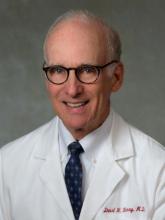Thursday, April 18, 2019
Statistics 101 for the oncologist
Episode 12:
David L. Streiner, PhD, of McMaster University and the University of Toronto, joins Blood & Cancer host David Henry, MD, of Pennsylvania Hospital, Philadelphia, to break down the basic statistics knowledge that doctors need – but may not have – to understand and contextualize research findings.
In Clinical Correlation, Ilana Yurkiewicz, MD, of Stanford (Calif.) University talks about reclaiming the term “sorry.” Dr. Yurkiewicz writes a regular column for Hematology News, which you can find by clicking here.
Show notes
By Emily Bryer, DO, resident in the department of internal medicine, University of Pennsylvania, Philadelphia
- Statistics provide objective evidence for whether we are seeing a true effect of a medicine or intervention, or if that outcome occurs because of chance alone.
- Clinical trials include a selective population (usually from tertiary care hospitals) and tend to involve the most severe cases.
- When interpreting data reported from a trial, it is essential to ask how similar the population in the trial is to the population you see in your clinical practice.
- Drug Approval Stages
- Phase 1: Assess drug efficacy and toxicity
- Phase 2: Identify correct dose; assess pharmacodynamics and pharmacokinetics
- Phase 3: Randomized, controlled trial necessary for confirming drug effectiveness and providing a comparison to current standard of care treatments
- How to design a trial
- Ensure that the surrogate endpoint is highly correlated to the outcome of interest
Additional reading by Dr. Streiner:
- Health Measurement Scales: A practical guide to their development and use (5th edition)
- PDQ Epidemiology (3rd edition)
How to Listen
Podcast Participants
David Henry, MD, FACP, is a clinical professor of medicine at the University of Pennsylvania and vice chairman of the department of medicine at Pennsylvania Hospital in Philadelphia. He received his bachelor’s degree from Princeton University and his MD from the University of Pennsylvania, then completed his internship, residency, and fellowship at the Hospital of the University of Pennsylvania. After 2 years as an attending in the U.S. Air Force, he was drawn to practicing as a hem-onc because of the close patient contact and interaction, and his belief that, win or lose with each patient, one can always make a difference in their care and lives. Follow Dr. Henry on Twitter: @davidhenrymd. Dr. Henry reported being on the advisory board for Amgen, AMAG Pharmaceuticals, and Pharmacosmos. He reported institutional funding from the National Institutes of Health and FibroGen.

